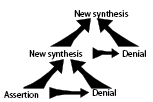Symbol systems can't think dialectically
Computers can't reason dialectically because they can't synthesize opposing meanings into new meaning. All they can do is just shuffle symbols that are given meaning by a programmer.
Joseph Rychlak (1991).

Note: Rychlak never claims that machines can't think. He just claims that they can't think dialectically or predicationally. He allows that they have demonstrative reasoning.
Postulates of the Dialectical Paradigm1. Dialectical reasoning involves oppositional and predicational thinking, and is only possible for teleological beings who can see from another's point of view.
2. Oppositional thinking proceeds by assertion, denial and new synthesis. An assertion is made and is opposed by a denial of that assertion. Out of this opposition, a new synthesis arises and transforms the original assertion by changing its context and/or scope.
3. "
Predication involves a cognitive act of affirming, denying or qualifying broad patterns of meaning in relation to narrower or targeted patterns of meaning" (Rychlak, 1991, p.7).
4. Teleological beings can engage in various goal-directed activities that place them in a meaningful relation to the world.
5. Computers reason mediationally, in other words they work with symbols in abstraction from their relation to meanings and the world.
6. Computers reason demonstratively. They can draw conclusions based on valid patterns of inference between symbols, but without working with the meanings of those symbols.
7. Computers cannot reason dialectically because they are nonteleological and nonpredicational. They do not understand meanings or the relations between them.